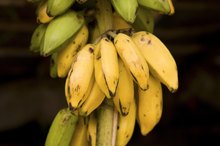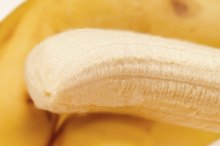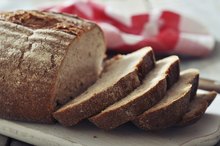What does fact checked mean?
At Healthfully, we strive to deliver objective content that is accurate and up-to-date. Our team periodically reviews articles in order to ensure content quality. The sources cited below consist of evidence from peer-reviewed journals, prominent medical organizations, academic associations, and government data.
The information contained on this site is for informational purposes only, and should not be used as a substitute for the advice of a professional health care provider. Please check with the appropriate physician regarding health questions and concerns. Although we strive to deliver accurate and up-to-date information, no guarantee to that effect is made.
Butternut Squash Nutrition
Butternut squash is a type of winter squash 3. As a gourd, winter squash has a tough rind, which allows for storage during the winter months. Storing and preparing butternut squash prolongs the vegetable's quality, ensuring it tastes as sweet and buttery as when you purchased or picked it 3. Butternut squash contains many different nutrients, such as vitamins A and C, potassium and fiber 3.
Nutrition Profile
Each cup of cubed butternut squash provides approximately 60 calories, 16 g of carbohydrates and 3 g of fiber 3. It also supplies almost 300 percent of your daily value of vitamin A, 50 percent of vitamin C, 7 percent of calcium and 5 percent of iron.
Vitamin A
Acorn Squash Nutrition Information
Learn More
Beta carotene imparts the orange-yellow color of butternut squash 3. In the body, beta carotene is converted to vitamin A, which helps maintain eye health. Vitamin A, a fat-soluble vitamin, also is important in maintaining healthy mucous membranes and other soft tissues, and it plays a role in promoting healthy skin.
Vitamin C
Butternut squash is an excellent source of vitamin C, which aids in wound healing and is important for gum health 3. Growth and repair of tissues depends on vitamin C. Cartilage, scar tissue, ligaments and blood vessels depend on vitamin C for development. Another function of vitamin C is increasing the body's absorption of iron.
- Butternut squash is an excellent source of vitamin C, which aids in wound healing and is important for gum health 3.
- Another function of vitamin C is increasing the body's absorption of iron.
Potassium
What Is the Nutritional Value of an Acorn Squash?
Learn More
The potassium in butternut squash helps maintain healthy blood pressure 3. Potassium is a mineral that also promotes normal body growth and protein synthesis for muscle development. Due to potassium's involvement in fluid balance and cellular electrical functions, it is considered an electrolyte. As a result, adequate intake of potassium is necessary for cellular function.
- The potassium in butternut squash helps maintain healthy blood pressure 3.
- Due to potassium's involvement in fluid balance and cellular electrical functions, it is considered an electrolyte.
FIber
Butternut squash is a sensible source of fiber, which can improve cholesterol levels while also keeping you regular 3. Other benefits of fiber include improving digestion, reducing constipation. Fiber also increases satiety, or the feeling of fullness, which can aid in weight management.
Related Articles
References
- "Seasonal and Simple: A guide for enjoying fresh fruits and vegetables"; University of Missouri Extension; 2009
- MedlinePlus: Vitamin A
- NutritionData: Butternut squash
- U.S. Department of Agriculture. Squash, winter, butternut, cooked, baked, without salt. FoodData Central. 2019.
- USDA. Daily Nutritional Goals for Age-Sex Groups Based on Dietary Reference Intakes and Dietary Guidelines Recommendations. 2020.
- Butternut pumpkin, boiled. Glycemic Index Database. The University of Sydney. Updated November 2019
- National Institutes of Health, Office of Dietary Supplements. Vitamin A. Updated February 14, 2020.
- Wong IY, Koo SC, Chan CW. Prevention of age-related macular degeneration. Int Ophthalmol. 2011;31(1):73-82. doi:10.1007/s10792-010-9397-5
- Di Noia J. Defining Powerhouse Fruits and Vegetables: A Nutrient Density Approach. Prev Chronic Dis. 2014;11:E95. doi:10.5888/pcd11.130390
- Harrison FE, May JM. Vitamin C function in the brain: Vital role of the ascorbate transporter SVCT2. Free Radic Biol Med. 2009;46(6):719-730. doi:10.1016/j.freeradbiomed.2008.12.018
- Jacobo-Valenzuela N, Zazueta-Morales J. Chemical and physicochemical characterization of winter squash (Cucurbita moschata D.). Notulae Botanicae Horti Agrobotanici Cluj-Napoca. 2011;39(1). doi:10.15835/nbha3915848
- Pullar JM, Carr AC, Vissers MCM. The Roles of Vitamin C in Skin Health. Nutrients. 2017;9(8):866. doi:10.3390/nu9080866
Writer Bio
Jessica Kovarik has been writing nutrition, healthy and physical fitness articles for three years. She is a registered, licensed dietitian. Kovarik specializes in sports nutrition, exercise physiology and medical nutritional therapy for heart health, celiac disease and diabetes.









